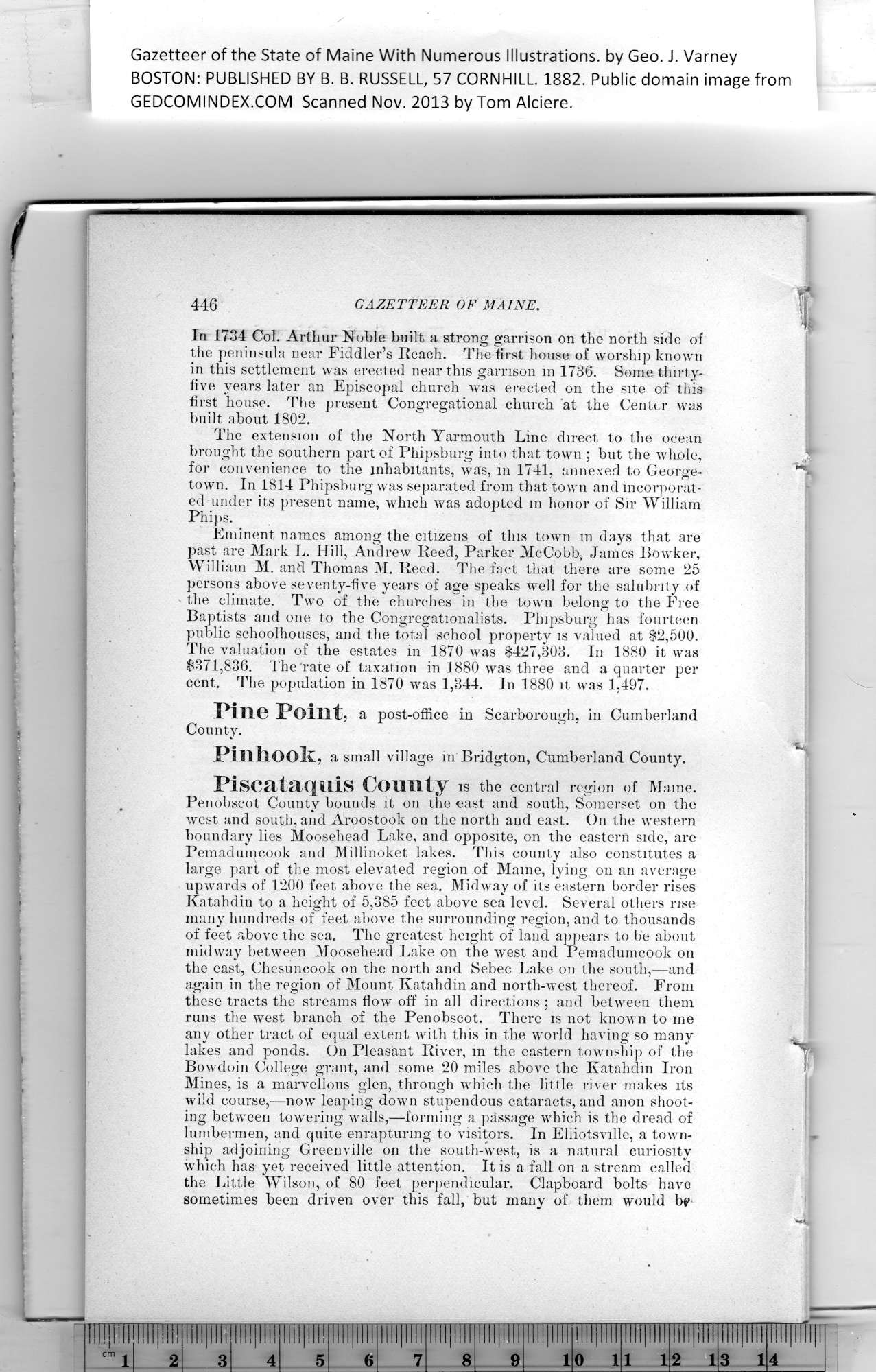|
Gazetteer of the State of Maine With Numerous Illustrations, by Geo. J. Varney
BOSTON: PUBLISHED BY B. B. RUSSELL, 57 CORNHILL. 1882. Public domain image from
GAZETTEER OF MAINE.
In 1734 Col. Arthur Noble built a strong garrison on the north side of
the peninsula near Fiddler’s Reach. The first house of worship known
in this settlement was erected near this garrison in 1736. Some thirty-
five years later an Episcopal church was erected on the site of this
first house. The present Congregational church at the Center was
built about 1802.
The extension of the North Yarmouth Line direct to the ocean
brought the southern part of Phipsburg into that town ; but the whole,
for convenience to the inhabitants, was, in 1741, annexed to George-
town. In 1814 Phipsburg was separated from that town and incorporat-
ed under its present name, which was adopted m honor of Sir William
Phips.
Eminent names among the citizens of this town m days that are
past are Mark L. Hill, Andrew Reed, Parker McCobb, James Bowker,
William M. and Thomas M. Reed. The fact that there are some 25
persons above seventy-five years of age speaks well for the salubrity of
the climate. Two of the churches in the town belong to the Free
Baptists and one to the Congregationalists. Phipsburg has fourteen
public schoolhouses, and the total school property is valued at $2,500.
The valuation of the estates in 1870 was $427,303. In 1880 it was
$371,836. The rate of taxation in 1880 was three and a quarter per
cent. The population in 1870 was 1,344. In 1880 it was 1,497.
Pine Point, a post-office in Scarborough, in Cumberland
County.
Pinhook, a small village in Bridgton, Cumberland County.
Piscataquis County is the central region of Maine.
Penobscot County bounds it on the east and south, Somerset on the
west and south, and Aroostook on the north and east. On the western
boundary lies Moosehead Lake, and opposite, on the eastern side, are
Pemadumcook and Millinoket lakes. This county also constitutes a
large part of the most elevated region of Maine, lying on an average
upwards of 1200 feet above the sea. Midway of its eastern border rises
Katahdin to a height of 5,385 feet above sea level. Several others rise
many hundreds of feet above the surrounding region, and to thousands
of feet above the sea. The greatest height of land appears to be about
midway between Moosehead Lake on the west and Pemadumcook on
the east, Chesuncook on the north and Sebec Lake on the south,—and
again in the region of Mount Katahdin and north-west thereof. From
these tracts the streams flow off in all directions ; and between them
runs the west branch of the Penobscot. There is not known to me
any other tract of equal extent with this in the world having so many
lakes and ponds. On Pleasant River, m the eastern township of the
Bowdoin College grant, and some 20 miles above the Katahdin Iron
Mines, is a marvellous glen, through which the little river makes its
wild course,—now leaping down stupendous cataracts, and anon shoot-
ing between towering walls,—forming a passage which is the dread of
lumbermen, and quite enrapturing to visitors. In Elliotsville, a town-
ship adjoining Greenville on the south-west, is a natural curiosity
which has yet received little attention. It is a fall on a stream called
the Little Wilson, of 80 feet perpendicular. Clapboard bolts have
sometimes been driven over this fall, but many of them would W
PREVIOUS PAGE ... NEXT PAGE
This page was written in HTML using a program written in Python 3.2
|
